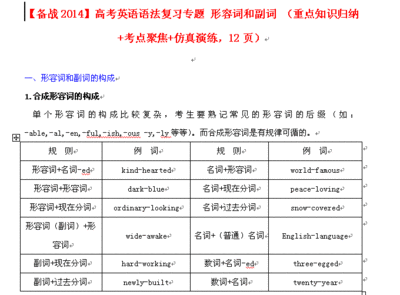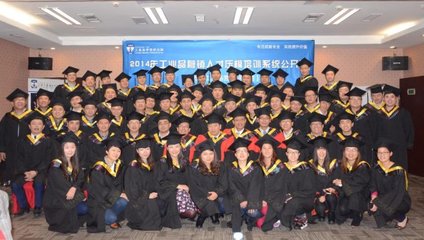副词系统归纳学习专题
一、副词的一般特点
1、 副词是一个可以修饰a.动词,b.形容词,c.另一副词,d.介词,e.连词,或f.整个句子的词。(黑体词为被修饰词)
a.He arrived late.Hestudies hard.
b.He is very honest.Hehas a rather difficult problem.
c.He arrived too late.Hestudies very hard.
d.He started long afterme.She sat just behind John.
e.He arrived long afterI did.She fell ill just because she worked toohard.
f.Luckily hesucceeded.Economically,Africa is underdeveloped
2、副词放在以下位置:a.放在所修饰词前面,b.紧跟所修饰词,c.放在最前头,d.放在最后头:
a.It is fairly easy.Heoften came here.
b.John will comesoon.Wait here please.
c.Yesterday John‘sfather suddenly came here.
d.He went to a villagefar away from the city yesterday.
3、 根据词义,副词可以分为下面几类:
a.时间副词,b.地点副词,c.方式副词,
d.程度副词,及e.(不)肯定副词:
a.He did yesterday.Hewas frequently failed.
b.John sleeps here.Marywent abroad.Let us climb up.
c.He slept soundly.Heran fast.We waited patiently.
d.He is extremelycruel.John walked too fast.
e.Certainly he willreturn.He will probably let me know.
4、副词和形容词一样可有等级。a.单音节词,以加-er和-est的方式构成比较级及最高级,b.以-ly结尾的副词,以加more和most的方式构成比较级和最高级。c.还有少数不规则的比较形式:
原级比较级最高级
____________
nearnearernearest
fastfasterfastest
quickly more quicklymost quickly
steadily more steadilymost steadily
cleverly more cleverlymost cleverly
ill/bad/badlyworseworst
wellbetter best
farfarther farthest
muchmoremost
littlelessleast
二、副词的普通用法
1.几乎所有副词可以用来修饰动词:
He diedhere.(地点)
He diedyesterday.(时间)
He diedsuddenly(方式)
Henearly(程度)died.
He hasprobably(肯定性)died.
2.程度副词可用来修饰下面的词:
a.形容词,b.另一副词,c.间或修饰动词:
a.He is rather silly.Thehouse is very dark.He has an extremely difficultproblem.
b.He ran much fasterthan I.He speaks English fluently enough.He works toohard.
c.He loves her verymuch.I little know that she is his sister.
方式副词也可用来表示程度,修饰形容词(d)或副词(e):
d.He is dreadfullysad.
Mary is remarkably simple.
She is lamentably poor.
He is comfortably warm.
e.He ran tolerablyfast.
He writes immeasurably better than I.
We have waited terribly long.
He read incredibly fast.
注:出于语音上的考虑,副词及所修饰的副词不能同时都以-ly结尾,避免说 Heworks terribly slowly.(但可说 He’s terribly slow.)
3.表示a.程度,b.时间,或c.地点的副词可以用来修饰介词:
a. He is much against myproposal.
He failed entirelythrough his own fault.
He arrived exactly atfive o‘clock.
he sat just behindme.
b. He came soon afternoon.
He left long before thewar.
c.Helives far beyond that pagoda.
He stood close besideme.
It is near(or hard)bythe bridge.
4.表示a.程度,或b.时间的副词可用来修饰连词:
a.Hefell ill partly because he worked too hard.
He met her exactly whenshe was angry.
b.He got married longbefore he was graduated.
He died soon after hegot sick.
5.表示a.肯定程度,及b.方式的副词可以用来修饰整个句子:
a.Hewill surely succeed.
Surely he willsucceed.
He will probablycome.
We must positively getthe license.
Yes,I can.No.Ican’t.
b.Happily,he waspardoned.
Luckily,he has tried hisbest and succeeded.
B.副词的特殊用法
6.少数副词可用来修饰名词。在这样用时,它们通常放在所修饰名词的前面:
He is quite ahero(=quite heroic).
He is regarded as rathera fool(=rather foolish).
He is almost achild(=almost childish).
Only Wang studiedEnglish last year.(No other students studied.)
Wang studied onlyEnglish last year.(not any other language)
(Even和almost的作用和only相同)
7.有些副词(多为地点副词)在修饰名词时,可以看作一个压缩的形容词从句(即定语从句):
He waited at the bridgethere(=that lay there).
His life abroad(=which was spentabroad)was hard.
The then king(=king thatreigned then)was cruel.
The above statement isfalse.
The up train(=train thatgoes up)comes at seven.
He went to a farcountry.
8.副词有时用在两个名词当中:
1)Latin words,namelytechnical terms,often keep their original pluralform.
2)Mr friends,especiallyMary,are very young.
9.有时副词出现在with和一名词中间:
10.When,where,why和 how可用来引起问句,也可同时用作副词和连词,也就是说,用作“关系副词”(RelativeAdverbs):
三、副词构成法
1.有些副词为简单副词(不带词尾):
often,out,quite,soon,home,back,
there,thus,seldom,ever
2.有些副词,特别是地点副词及时间副词,常常以加词尾的方式构成:
-ly(=every):yearly,monthly,daily,fortnightly
-ward(s)(=toward):backward(s),leftward(s),upward(s),homeward(s),eastward(s),onward(s),inward(s)
-wise,-ways:lengthwise,clockwise,likewise,otherwise;always,lengthways,sideways-long:headlong-ling(s):sideling(s)
-s:upstairs,outdoors,sometimes,nowadays,needs或在一些单音节词前加词头或其他简单字:
a-:along,away,abroad,apart,aside,adraft,aloud,ashore,across,above
be-:before,below,beneath,besides
介词:inside,overboard,uphill,beforehand,today
there-:therein(=inthat),thereafter,thereby,thereof,therewith,ect.(陈旧用法)
here-:herein(=inthis),hereafter,hereby,hereof,herewith,etc.(陈旧用法)
where-:wherein(=in whatorwhich),whereon,whereby,whereof,wherewith,ect.(陈旧用法)
3.绝大多数副词都由形容词以下述3种方式构成:
a.大多数方式副词,都在形容词后加-ly构成。英语中有若干对副词,其特点是后者通常在前者后加-ly所构成,常见的有:注意拼法:
形容词副词形容词副词
gladgladlymournfulmournfully
happyhappilyheavyheavily
jollyjollilysillysillily
shyshylydrydryly
duedulytruetruly
ableablyprobableprobably
dulldullyfullfully
vilevilelysolesolely
despotic despoticallyidiomaticidiomatically
publicpubliclyclean,cleanly;
clear,clearly;low,lowly;
direct,directly;just,justly;straight,straightly;strong,strongly;
注意下列形容词与副词在词义上有差异:
near,nearly;pretty,prettily;
right,rightly;short,shortly;
wide,widelydead,deadly;
deep,deeply;late,lately;
hard,hardly;high,highly;
close,closely;most,mostly;
fair,fairly;

(例外情况)
ill-naturedill-naturedly
kind-heartedkind-heartedly
provokingprovokingly
charmingcharmingly
falteringfalteringly
lingeringlingeringly
mistakenmistakenly
hiddenhiddenly
markedmarkedly
undisguisedundisguisedly
但是:friendly(形容词)—in afriendly way;manly(形容词)—in a manly manner;kingly(形容词)—in akinglymanner.
4.和形容词一样,以-ingly或-edly结尾的副词,也有激起感情及感受情绪的差别,但用得比较少,如:
激起情绪感受情绪
He speaksamusingly.We listenamusedly.
The flowers bloomdelightfully. We watch them de-ligtedly
He behavesdisgustingly.We left disgustedly.
The fight goes onexcitingly. We look on excitedly.
5..有少数副词和形容词形式相同:
He came in the lateafternoon.(形容词)
He arrivedlate.(副词)
He has waited for a longtime.(形容词)
He has waited solong.(副词)
6.另一些与形容词同形的副词有:
early,fast,far,near,well,ill,high,low,much,lit-tle,only,enough,hard,straight,right,wrong,left,east,west
在口语中有些形容词直接用作副词:
It is mightygood.
I am deadtired.
The soup is precioushot.
He is terriblerude.
7.有些单音节形容词有两个副词形式,一个带-ly,一个不带,意思不相同:
We must buy cheap(=at alow price).We got offcheaply(=easily).
He liveshigh(=luxuriously).He spoke highly(=well)of me.
He came near.Henearly(=almost)died.
He played foul.He wasfoully murdered.
I love Mary most.Theyare mostly crazy.
8.有少数副词与指示代词同形:
He has some(=about)fiftypounds.
Itsomething(=somewhat)astonished me.
I care nothing(=not atall)for your threat.
Can you wait any(=in anyway)more?I can’t wait anymore.
I slept none(=never).Ipassed the night none too com-fortably.
Is itthat(=so)easy?
He isall(=entirely)alone.
 爱华网
爱华网



